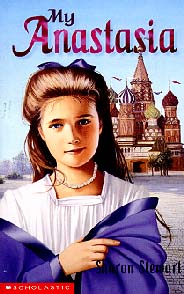|
________________
CM . . . .
Volume VI Number 9 . . . . January 7, 2000
excerpt: "My lessons with Petrov continued. Tatiana sometimes joined us now, and when she did, Anastasia had to behave. The rest of the time, hardly a lesson passed without some kind of prank. Once day she arrived dressed up like a chimney sweep with her face blackened, and sat that way until Tatiana, arriving late, threw up her hands in horror and dragged her out. Another day, she found a way to balance a paper bag full of flour over the door, so that when poor Petrov entered, it tumbled down on him, powdering his head and shoulders white. Another time, she put an air cushion on his chair. When the poor man sat down a loud rude noise was heard. The little shvipsik always kept a straight face through all her mischief, but her wicked blue eyes would dance. Other times, she would suddenly burst out laughing, as if she had thought of the funniest thing in the world. Well, people who tickle themselves can laugh when they like."Anastasia Nikolaevna, youngest daughter of Tsar Nicholas II and Alexandra Feodorova, has inspired numerous fictional accounts. Stewart focuses indirectly on Anastasia by creating young Dunia Ivanovna who, while running away from her father and stepmother in August of 1911, encounters a drunken Grigory Efimovich Rasputin, mystic and healer, in the Siberian village of Pokrovskoe. Rasputin departs almost immediately for St. Petersburg, taking Dunia with him. In St. Petersburg, he acts as advisor and healer for the Tsar's family, particularly the heir, Alexei, a hemophiliac. Rasputin installs Dunia in the house of Ania Vyrubova, confidante of the Tsarina, insisting the Flea, as he dubs Dunia, has been "sent to me by God himself. She is a tool put in our hands" to facilitate his manipulation of the Tsar and Tsarina. Introduced into the Tsar's household at Tsarskoe Selo, Dunia meets the family and soon becomes an integral part of their entourage although Anastasia, spirited and mischievous, initially treats her rudely. As narrator, Dunia observes and experiences the fortunes of the Romanovs first hand as momentous events unfold in Russia's history from 1911 to 1918. Russia's entry into World War I on the side of the allies further alienates the Tsar from the people. The unstable political situation in Russia, exacerbated by Rasputin's interference and influence on the Tsarina, eventually explodes in 1917 and forces the Tsar's abdication to Kerensky and the creation of the Provisional Government. The family and household face confinement in the Alexander Palace for five months until August, 1917, when, with the Bolsheviks poised to overthrow the Provisional Government, Kerensky moves the Romanovs to the Siberian town of Tobolsk. By May of 1918, the Bolsheviks imprison them in the Ipatiev House in Ekaterinburg, their final internment. Yurovsky and his Red Army compatriots execute the entire Romanov family and four of their retainers during the night of July 16, 1918. Dunia accompanies the family throughout their confinement by functioning as both friend and servant; she survives the massacre locked in the servant's house next door. Stewart's account of the Romanovs' final years, revealed through Dunia's first person narrative, shows a loving family united in its concern for Alexei's health and welfare. The Russian public's anger toward the Romanovs puzzles and concerns Dunia who observes, "People became angrier and angrier. Reform was no longer enough, they cried. The Tsar and his government had to go. It was revolution. Panic spread in the city as people accused the Tsar of starving the people on purpose." Dunia may be only a peasant girl, but she displays considerable insight into human nature and recognizes early in her acquaintance with Rasputin that he is "a trickster, a shape-shifter, a wild wolf always hungry" and that the "people weren't fooled by Grigory." Many personal facts about Anastasia and her family that Stewart includes parallel those presented at Bob Atchison's "My Name is Anastasia" website, (http://www.alexanderpalace.org/anastasia/) . The prose style is direct and flows smoothly with plenty of realistic dialogue and attention to detail; however, a glossary would have helped with the Russian terms that are scattered throughout the text. Younger readers may find the patronymics confusing, not to mention all the character and place names. Like Stewart's 1998 exploration of Marie Therese in The Dark Tower, short listed for the Geoffrey Bilson Award, My Anastasia allows readers to glimpse a turbulent revolutionary era through the eyes of a young person who comes of age amid the conflict. Recommended. Darleen Golke works as the teacher-librarian at Fort Richmond Collegiate in Winnipeg, MB.
To comment on this title or this review, send mail to cm@umanitoba.ca.
Copyright © the Manitoba Library Association.
Reproduction for personal use is permitted only if this copyright notice
is maintained. Any other reproduction is prohibited without
permission.
Published by
TABLE OF CONTENTS FOR THIS ISSUE - January 7, 2000.
AUTHORS |
TITLES |
MEDIA REVIEWS |
PROFILES |
BACK ISSUES |
SEARCH |
CMARCHIVE |
HOME
|
